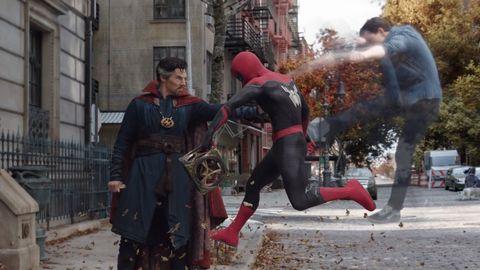Did Sony Just Leave Spider-Man with No Way Home to the MCU?
FTC Statement: Reviewers are frequently provided by the publisher/production company with a copy of the material being reviewed.The opinions published are solely those of the respective reviewers and may not reflect the opinions of CriticalBlast.com or its management.
As an Amazon Associate, we earn from qualifying purchases. (This is a legal requirement, as apparently some sites advertise for Amazon for free. Yes, that's sarcasm.)

The comics-sphere is going to be abuzz this week with talk of the latest MCU joint venture, Spider-Man: No Way Home. Much of that buzz will come from people who haven't seen it yet and are excited to get to it, while those who have seen it try to hold the spoilery bits inside so they don't come across like the jackasses of the Internet.
Hee-haw.
This review is going to talk about some of the plot points of this film -- because to fully explain the grade given, those plot points need to be discussed. However, those plot points will be discussed in paragraphs following this one, so it's still not too late to back out and come back later. For the most part, Spider-Man: No Way Home was a movie of moments -- fan moments that produced audible gasps from the audience in which I was attending (a full theater, at noon on a Sunday, which only further supports how excited people are for this film). However, upon reflection, those moments don't necessarily add up to a movie.
The film picks up from the cliffhanger moment of Spider-Man: Far From Home, where the world has learned that Peter Parker is Spider-Man, and believe him to be a murderer (because they believe Mysterio to have been a hero). This, in and of itself, could be a full-blown movie. It would at least be a full 22-episode arc if Spider-Man were a CW show. Instead, it's a problem... and then it's not. It turns out Peter has a "really good lawyer" (Hello, Charlie Cox!) who informs him the charges against him can't stick -- and so they don't. That doesn't mean, however, that the public knowledge of Spider-Man's identity isn't a problem, forcing him to have to relocate. It also impacts those closest to him, who have their dreams shattered by their association with him.
To put things right, Peter goes to the one man he believes can help him -- Doctor Stephen Strange (Benedict Cumberbatch), who steals every scene he's in. Peter's hope is that Dr. Strange can reverse time and ten make it so no one learns Peter's identity. But Dr. Strange no longer has the Time Stone. He does, however, give Peter an idea: make everyone forget that Spider-Man is Peter Parker. Strange agrees and, as he casts the spell, says the world is going to forget about Peter Parker -- for which Peter suddenly has a list of caveats and exceptions. As Strange tries to modify the spell mid-casting, things go awry and everyone who knows Peter Parker is Spider-Man -- those in other universes -- are drawn to Earth-MCU, setting the stage for more-than-just-cameo appearances by Green Goblin (Willem Dafoe), Doctor Octopus (Alfred Molina), Electro (Jamie Foxx), Lizard (Rhys Ifans), and Sandman (Thomas Haden Church). And if you think that list is incomplete, don't worry -- patience rewards the fans with an appearance by Topher Grace as Eddie Brock.
And those are only the tip of the iceberg. It's a multiverse, so the number of people who know Spider-Man's identity, in that context, are infinite, and the implications of infinite people being drawn to a finite space are... well, you can do the math and see the problem.
Strange is prepared to send all the villains back (once Spider-Man goes on a Poké-villain hunt to capture them all one at a time. But Peter is averse to sending these characters back to their respective universes if it means they are going back to the moment of their deaths, when their various psychoses can be fixed. (Which has nothing to do with the timeline running differently, but we needed something to chew up an hour of film, so there we go.)
This is done almost too easily, but is disrupted when one of the villains rejects the treatment and leaves death and destruction in his wake, putting Peter on a crusade of personal vengeance. Cue Peter Parker (Andrew Garfield) and Peter Parker (Tobey Maguire), who also came over with their respective villains but have been keeping to themselves while fully aware, rather blithely, of this cosmic shift of events despite being the only superheroes on their worlds.
Seeing all the Spider-Men together serves as a sort of therapeutic moment for all of them, with Garfield playing a much more approachable and likeable Peter here than in the Amazing Spider-Man films. Maguire, older now, is almost the "dad wisdom" Spider-Man, and we can't help but wonder if he and Mary Jane are raising a little May "Mayday" Parker at home.
(LARGER SPOILER COMING NOW)
As the world falls apart, the villains are found, and Doctor Strange saves the day after escaping a trap Peter put him in over an argument about what to do with the villains. And Peter learns the hard lesson of getting his "One More Day" wish, as the world doesn't forget that Peter Parker is Spider-Man -- they forget Peter Parker entirely! This includes Doctor Strange. Which leaves Peter in quite the predicament. The spell apparently didn't just effect memories, but also any written, photographic, or digital content that mentioned Peter. High school yearbooks, transcripts, birth certificates, DMV records. Peter is utterly forgotten. We can deduce this from the fact that endscene Peter has a G.E.D. manual for the purpose of getting his diploma because now he never went to high school. Yet he could still rent an efficiency apartment. We assume he'll be able to get a job even without proper identification. Being just out of high school, one could assume he could say he was born via midwife on a farm and was home schooled from there on, explaining his need to establish these documents, but that's an excercise of a different sort. Rather, this seems to me to be Sony's ticket to getting the Spider-Man license back solely to themselves without having to keep the larger MCU connected, since the MCU has now had Peter Parker wiped from its collective existence.
This is a fan pleasing film, insofar as it brings back fan favorite characters and actors. It's also overly long, speeding through important story elements to get to the cool shots, and says a little too loudly, "Look, we can have a multiverse, too!" (although not as loudly as Riverdale's recent attempt at one). Jamie Foxx gets to deliver a great line when he tells Peter (the Tom Holland one) that he would have thought given Peter's background that he would have been black, but that there must be a black Spider-Man somewhere in an infinite multiverse.
It's a fun movie, but not one that holds up to scrutiny -- even given the suspension of disbelief -- when you start to think the story thread through. So don't overthink it -- just enjoy it!

(Sony missed a rather obvious opportunity by not including a quick recreation of the meme-worthy scene from Spider-Man 1967 cartoon series.)


